- Contrast Contrast
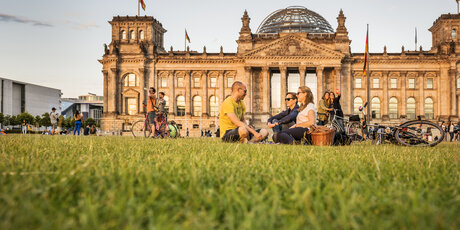

Reichstag in Berlin
Parliament and mirror of German history
The Reichstag bears silent witness to the turbulent history of Berlin and is one of the city’s most significant historical buildings.
Berlin is the city where German history is written. Where is the best place to experience it? Come and explore the Reichstag !
Reservations and tickets – how to visit the Reichstag
There are several options to visit the Reichstag:
- join a guided tour
- listen to a plenary session (in German of course)
- climb up to the dome and the roof
Online registration at the Bundestag (German parliament)
A quick look around or a detailed tour - both is possible but only with an advanced booking. For this, simply use the online form and you can find further information at bundestag.de .
Our tip : There are a lot of visitors to the Reichstag on weekends. If possible, it´s better to choose a time midweek.
Other tickets for tours in the Reichstag and government district
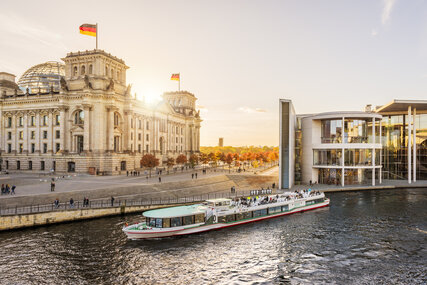
Enjoy a boat ride past the government district
Take photos of the Reichstag and the government district from the water on a boat trip through Berlin.
Ticket for boat trips
City tours and guided tours with Reichstag
Explore the government district and learn more about Berlin´s history and the architecture of the Reichstag building during a city tour.
Popular tickets among our visitors can be found at visitBerlin.de
- Insider Tour Insider Walk
- Individual city tours
Hop On / Hop Off - Bus tours with a stop at the Reichstag
Explore Berlin´s sights during the bus tour and get off directly at the Reichstag. Book your tickets directly at visitBerlin.de and avoid long queues in Berlin.
Tickets for bus tours
A short history of the Reichstag
The Reichstag is an internationally recognisable symbol of democracy and the current home of the German parliament . Every year, thousands of guests visit the Reichstag - and with good reason: It is not often that you can enjoy such an amazing panorama while, just beneath your feet, the political decisions of tomorrow are being made. Both as an architectural wonder and a historical testimony, the Reichstag has an important role to play in Berlin.

The original building is designed by Paul Wallot and modelled after the Memorial Hall in Philadelphia. Decorative motifs, sculptures and mosaics are contributed by the artist Otto Lessing. The Reichstag is completed in 1894 although it doesn’t acquire its iconic dedication to “the German People” until 1916 when the words Dem Deutschen Volke are inscribed on its façade. At the time Kaiser Wilhelm II regards the building as “the pinnacle of bad taste”. The Reichstag serves as the home of the German parliament until 1933 when the building is badly damaged in a fire. This event marks the end of the Weimar Republic and provides a convenient pretext for Hitler to suppress dissent. Under Nazi dictatorship, the building falls into neglect and is severely damaged during the Second World War. In 1945 it becomes one of the primary targets for the Red Army due to its perceived propaganda value.
After the war, West Germany’s parliament is relocated to Bonn, and the building remains a virtual ruin until 1961 when a partial renovation is undertaken in the shadow of the newly erected Wall. Completed in 1964 this controversial restoration sees the building’s interior and exterior stripped of the majority of its statuary. However, the city makes efforts to retain the traces of its more recent history such as the bullet ridden façade and the graffiti left by the occupying Soviet soldiers. Throughout the cold war period and until the German reunification in 1989 the Reichstag is the site of a permanent exhibition, “Questions about German History” but otherwise sees only occasional ceremonial use. In 1990 the Reichstag is the site of the official reunification ceremony. After another year of intense debate, it is decided that it will once again be the home of the German national parliament . In 1995, just prior to the commencement of Norman Foster’s restoration of the building, artist Christo and his wife Jeanne-Claude wrap the Reichstag in fabric. Foster’s careful restoration and redesign of the building is completed in 1999, and the new German government convenes at the Reichstag for the first time on April the 19th.
There is a certain irony in the fact that the building’s glass cupola is not featured in Foster’s original plans for the renovation of the Reichstag. The dome sits directly above the debating chamber. A mirrored cone at its centre directs light into the Reichstag, increasing the building’s energy efficiency and affording visitors a view of the parliamentary proceedings below. The dome itself can be visited by prior registration and is reached by two large steel ramps that curve up towards it in the form of a double helix.
Five fascinating facts about the Reichstag
Image gallery
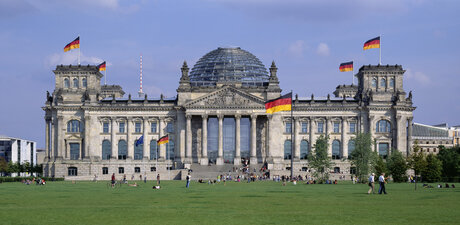
The Reichstag with flapping flags

The Reichstag in winter

Dome in the Reichstag

Frontview of the Reichstag
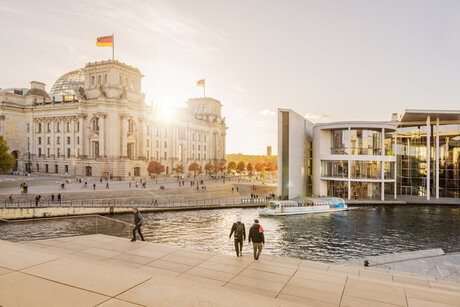
Spree with a view of the Reichstag
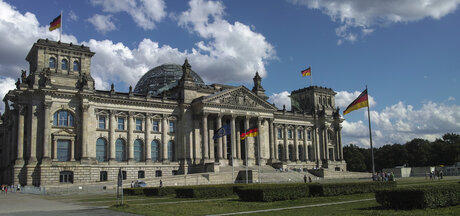
The Reichstag in Berlin in summer

- Cyrillic graffiti left by Soviet soldiers, after their siege of the Reichstag in 1945, has been carefully preserved and can be still seen by visitors today.
- A true example of eco-architecture, the Reichstag is highly self sufficient in its production of energy. The shape of the dome allows the building to make use of natural lighting and ventilation which makes the building a unique symbol of sustainability.
- The Reichstag is an important art venue. It has a considerable art collection and shows changing exhibitions as well as permanently installed artworks.
- The roof of the Reichstag is home to the Käfer Dachgarten Restaurant where guests with a prior reservation can enjoy a delicious breakfast, lunch or dinner. Free panoramic view included!
- Besides its eventful history, Berlin is known to be a casual and friendly city. See for yourself on the grass in front of the Reichstag. This is a perfect place for picnics and a popular spot for sunbathing and relaxing.
What to see nearby when you visit the Reichstag
There are a number of important Berlin landmarks situated in the immediate vicinity of the Reichstag. The main railway station, the Bundeskanzleramt and the Brandenburger Tor are all located a short walk away from the parliament building. You can also find a number of memorials nearby. These include the astounding Holocaust-Memorial by Peter Eisenman that consists of 2,711 concrete slabs arranged in a grid in which you can suddenly feel very disoriented and small. Another nearby memorial consisting of a circular pool commemorates the Sinti and Roma victims of National Socialism, whilst a concrete cube containing a video memorialises the homosexuals persecuted under Nazism.
How to get to the Reichstag using public transport
The Reichstag is easily accessible by public transport as it is situated just a short distance from Berlin’s main rail station, the Hauptbahnhof . The number 100 bus, which provides an unrivalled sightseeing opportunity along its route between the Zoo Station in the West and Alexanderplatz in the East, also stops at the Reichstag, as does the M41. The nearest U-Bahn station to the Reichstag is the Bundestag. It is the middle station of only three stations on what is surely Berlin’s shortest U-Bahn line which runs between the Hauptbahnhof and Brandenburger Tor.
The dome and roof terrace are open from 8.00 a.m. to 6.00 p.m. in the winter months (1 November to 31 March) and from 8.00 a.m. to 8.00 p.m. in the summer months (1 April to 31 October).
The dome and roof terrace are closed all day on 24 December and from 4 p.m. on 31 December (last admission at 2.30 p.m.). The dome can be visited from
15 to 19 April 2024 08 to 19 July 2024 22 to 26 July 2024 21 to 25 October 2024 and from 28 October to 1 November 2024
cannot be visited due to cleaning and maintenance work. The roof terrace will remain accessible during these dome closures.
- Share on Facebook Share on Facebook
- Share on X Share on X
- Share by email Share by email
- Print page Print page
Platz der Republik 1 11011 Berlin
You might find this also interesting
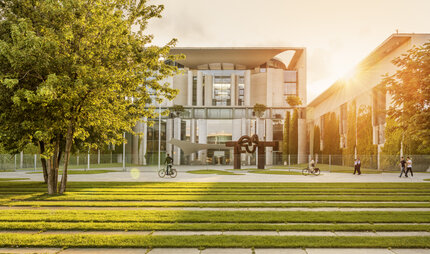
Political transparency for the citizens
German Chancellery
Berlin’s Federal Chancellery houses the offices of the German Chancellor – and is the modern counterpart to the Reichstag Parliament
Show details

Symbol of German reunification
Brandenburg Gate
Brandenburg Gate is the first stop for every visitor to Berlin! The city’s iconic landmark offers fascinating insights into the city’s
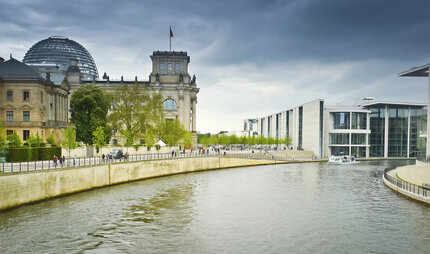
Connecting East and West
Band des Bundes
Berlin’s government buildings form a bridge over the river Spree connecting East and West. Known as the Band des Bundes – the “Federal
Deutscher Bundestag
Online registration, general information.
Current information on the options available to visitors, along with up-to-date entry requirements for the day of your visit can be found in German online under “Aktuelle Informationen zum Besuch beim Deutschen Bundestag” in the “Aktuell” section of the Bundestag's website (www.bundestag.de).
Important information (please read before starting the online booking process!):
- When registering to visit online , you can only submit booking requests for the various services offered by the Visitors’ Service; your visit has not been booked until you receive a booking confirmation from the Visitors’ Service by email, fax or post.
- Please make sure – before you begin the process of registering online for one of our services for visitors – that you have each visitor’s last name, first name and date of birth ready, as you will need to create a list of visitors and provide this information during this process. Only after you have submitted this information can your request be processed and confirmed.
- As a rule, requests for guided tours can only be submitted for the current month and the following two months.
- Requests to visit the dome can only be submitted for the current month and the following month. Parliamentary business, weather conditions and the security situation all affect whether visits to the dome and the roof terrace can go ahead. We are therefore unable to guarantee that you will be able to visit the dome. It is sometimes necessary to cancel a visit to the dome at the last minute , even if the visit has been confirmed in advance. Unfortunately, it is not possible for us to notify you of last-minute cancellations by email, telephone or fax.
- Tourism businesses must register as commercial agencies . Submitting a request as an individual/private group or an organisation/company will result in the immediate cancellation of the request. If staff or agents of the tourism business, tour guides or similar wish to accompany the registered visitors onto the premises of the German Bundestag (including the dome of the Reichstag Building), they must also be registered (or will otherwise be denied entry).
- Booking requests for the following year can only be submitted from the end of November of the current year .
- With regard to plenary sittings, no interpretation into foreign languages is provided in the visitors’ galleries.
Popular currencies
More currencies.

English or German Guided Tour of the Reichstag Building
- Instant confirmation
- Mobile ticket
Learn the eventful history of Berlin as you walk the corridors of its parliament on this absorbing guided tour of the government district, the Reichstag building, and the fascinating glass dome.
Embark on a guided tour of the parliament and the government district of Berlin as you learn about the city’s political and historical background.
Visit the Reichstag building and learn about its complicated location on the Berlin Wall from an English or German-speaking guide.
Head up to the central dome of the Reichstag and understand how its transformed into a modern landmark.
Pass by some of the most famous city attractions in the vicinity including Berlin Palace, Memorial Church, and more with the available ticket option.
Fun Fact: The building became the focus of the art world in June 1995 when it was wrapped in 100,000 square meters of silver fabric by the environmental sculptors Christo and Jeanne-Claude.
2.5-hour guided tour of Reichstag
Expert English or German-speaking guide
Access to the Reichstag building and dome
360° views from the Cupola
Visit of the Plenary Hall (optional)
Cancellation policy
You can cancel these tickets up to 48 hours before the experience begins and get a full refund.
Ratings & Reviews
Your Experience
Visit berlin's political heart.
Begin at Pariser Platz and make your way to the Parliament and Government District. The Reichstag is a globally recognized symbol of democracy and the current seat of the German parliament. Admission here is free of charge but the 2.5-hour guided tour is what takes your experience to a different level. Take a behind-the-scenes look at politics and discover interesting facts about Berlin's government district, which is located directly on the former Berlin Wall.
Cross the historical border
This English or German-guided tour of Berlin's parliament and government district will introduce you to some of Germany's political history. Learn more about famous buildings like the Hotel Adlon and the Brandenburg Gate, and see the sights from a different angle. At Brandenburg Gate, cross the historical sector border and learn about the Reichstag building and its complicated location on the Berlin Wall.
Discover the Reichstag dome
Climb the Reichstag's glass dome to learn more about the Bundestag's tasks and responsibilities. Discover the intriguing history of the Reichstag and how Lord Foster transformed it into a modern landmark. Enjoy the city's skyline, and get a bird's-eye view of Berlin on this tour.
Know Before You Go
Important information.
The visit of the leadership of the Reichstag requires confirmation by the German Bundestag.
The guided tour is conducted in German and English.
Please note: Admission to the building is free of charge and you are paying just for a guided tour of the government quarter and the Reichstag with this ticket.
Your voucher will be emailed to you instantly.
Display the voucher on your mobile phone with a valid photo ID at the meeting point.
Please arrive at the meeting point 10 minutes before the scheduled time of your visit to avoid any delays.
Meeting Point
- Please check your final voucher for the meeting point details and specific instructions.
Why Headout?
Similar experiences you'd love.

Top things to do in Berlin

Browse By Themes
Nearby cities to explore.

World at your tap.

We've served 25 million+ guests and we are here for you
25 million +
In the Media
24 x 7 Help Center
- Berlin Attractions
- Architecture
- Plan Your Visit
- Berlin TV Tower
- Friedrichstadt Palast
- Illuseum Berlin
- Wintergarten Variete
- Berlin Welt Balloon
- Studio of Wonders
- Panoramapunkt Berlin
- Berlin Icebar
- Berlin Wall Museum
- Big Bus Berlin Hop-On Hop-Off
- AquaDom & SEA LIFE Berlin
- Sachsenhausen Concentration Camp
- City Sightseeing Berlin Hop-On Hop-Off
- LEGOLAND Discovery Centre Berlin
- Fotografiska Tickets
- Walking Tours
- Hop-On Hop-Off Tours
- Sightseeing Cruises
- Dinner Cruises
- Travel Guide
- Festivals and Events
Berlin Reichstag Tickets & Tours
Headout is an authorized and trusted partner of the venue, offering curated experiences to enjoy this attraction. This is not the venue's website.

English or German Guided Tour of the Reichstag Building
- You can cancel these tickets up to 48 hours before the experience begins and get a full refund.
- Get acquainted with Germany’s political history on this English or German-guided tour of the parliament and the government district of Berlin.
- View iconic buildings such as the Hotel Adlon or Brandenburg Gate from a different perspective.
- Get a chance to climb up to the cupola that offers spectacular views of the cityscape.
- Visit more than 10 attractions located in the vicinity of the Parliament House such as Berlin Palace, Memorial Church, and Postdamer Square with the available ticket option.
- 2.5-hour guided tour of Reichstag
- Expert English or German-speaking guide
- Access to the Reichstag building and dome
- 360° views from the Cupola
- Visit of the Plenary Hall (optional)
- Tip: Consider visiting Checkpoint Charlie, one of the most famous border crossings between East and West Berlin during the Cold War.
- The visit of the leadership of the Reichstag requires confirmation by the German Bundestag.
- The tour operator does the registration for the customer for this product, the customer does not need to do it themself

Berlin WelcomeCard with Potsdam: Public Transport (Zones AB) & Discounts
- Planning a trip to Berlin? The Berlin WelcomeCard offers 25-50% off at 180+ spots in Berlin. Think scrumptious restaurants, city tours, and more!
- Skip the wallet-crushing individual tickets at places like the Berlin TV Tower, GDR Museum, and Madame Tussauds.
- Zip around the city hassle-free on bus tours and public transport in the Berlin AB zones (Berlin's urban area).
- Pick a WelcomeCard that suits your journey: from 2 to 6 days. Plus, crank up the fun with a ticket upgrade with an immersive multilingual audio guide.
- Don't forget to carry a printed copy of your ticket, delivered straight to your mailbox along with a city guide and map in English and German languages.
- Variants: 48/72-hours or 4/5/6-days
- Access to 180+ attractions
- Public transport in Berlin AB zones
- Audio guide in German, English, French, Italian & Spanish (optional)
- Museums: 1968 Museum, Berlin Magic Museum, Bröhan-Museum & more
- Attractions: Schönhausen Palace, Berlin Cathedral, Madame Tussauds & more
- Cruises: Berlin Cityschiffsfahrten, Reederei Bruno Winkler, Solarwaterworld & more
- Discounts at Aapka, Steakhouse Las Malvinas, Gezer Spa
- Get complete details here
- Children between the ages 6 and 14 can travel free on an adult’s ticket (3 per ticket).
- Note that the AB fare zone covers Berlin’s urban area.
- Please note that you cannot extend the Berlin WelcomeCard AB fare zone by adding a single connection ticket for the C fare zone (covering Potsdam and Airport Berlin Brandenburg)
- After you receive your digital tickets, print the ticket in A4 format and carry it with you as it is validated only in printed form.
- To access discounts on attractions and other services, you must show your ticket to each discount partner before availing of the discount.
- The public transport tickets can be validated before your first journey anywhere in the city. Spot the validation machines with ease in the airport, city railway platforms, buses and trams.
- The 48-hour and 72-hour tickets are valid for exactly 48 hours or 72 hours, from the moment of validation. For instance, if you’ve picked the 48-hour card, and use it for public transport at 8:30am, then it is valid till 8:29am for the following day.
- The 4, 5 & 6-day cards are valid depending on the calendar days you pick. If you’ve opted for a 4-day card and you validate the ticket at any time on Wednesday, the Berlin WelcomeCard and public transport ticket is then valid until midnight on Saturday.
- These tickets can't be cancelled or rescheduled.

2.5-Hour Guided Tour of the Reichstag Building & Government District
- Immerse yourself in Germany's political history at the government district in Berlin with a guided tour of the Reichstag available in English and German.
- Discover iconic buildings like the Hotel Adlon, where personalities like Albert Einstein, Charlie Chaplin, Michael Jackson, and Barack Obama have stayed.
- Visit the historical sector border at Brandenburg Gate lined by Greek Doric columns, and learn about Reichstag's complex placement near the Berlin Wall.
- Take advantage of the opportunity to ascend to the glass dome, where breathtaking views of the cityscape await you.
- 2.5-hour guided tour of the government district
- Guided tour of the Reichstag and dome
- Tip: In Reichstag take note of the "Kuppel des Reichstags" by Olafur Eliasson, an installation that enhances the interior of the dome with mirrors and reflective surfaces.
- The tour operator does the registration for the guests, the guests don't need to do it themselves.
Top things to do in Berlin

From Empire to Republic | Exploring the history of the Reichstag building
The Reichstag building, located in the heart of Berlin, stands as a powerful symbol of the country’s political past. The building has witnessed pivotal moments, from the proclamation of the Weimar Republic to its destruction during World War II. After German reunification in 1990, a glass dome was added to its structure, which was designed by architect Norman Foster. This transparent dome offers panoramic views of Berlin and symbolizes the unity of the German people. Today, the Reichstag is home to the German Bundestag, the federal parliament.
Why go on Reichstag tours?

- Historical significance: The Reichstag was originally built to house the Imperial Diet of the German Empire, later succeeded by the Reichstag of the Weimar Republic. The building has witnessed several key moments in the country’s history.
- Meaningful symbol: The Reichstag is a symbol of German democracy. After the reunification of Germany in 1990, the building underwent extensive renovations, and the iconic glass dome was added.
- Architectural marvel: The Reichstag's architecture is a blend of historical and modern elements. The addition of the glass dome, designed by architect Norman Foster, offers panoramic views of Berlin.
- Houses the Bundestag: The Reichstag is home to the German Bundestag, the federal parliament. You can observe parliamentary sessions and committee meetings and foster an understanding of Germany's political system and democratic processes.
- Cultural hub: The Reichstag building is situated in a vibrant area, with landmarks such as the Brandenburg Gate and Tiergarten Park nearby.
Which Reichstag ticket is best for you?

If you are on a budget
Go for: guided tours Duration: 2 hours 30 minutes Guide: expert English or German-speaking tour guide
- Book this guided tour of the Reichstag building to learn about Germany’s political history.
- Visit more than 10 attractions such as the Berlin Palace, Memorial Church, and Potsdamer Church with these guided tours on an affordable budget.
Recommended tours:
- English or German guided tour of the Reichstag building
- 2.5-hour guided tour of the Reichstag building & government district

If you are short on time
- If you do not have much time, you can choose Reichstag guided tours to understand Germany’s political history. You can choose between an English and a German tour guide.
- You can enjoy panoramic views of the city from the Reichstag dome and visit other iconic attractions like Hotel Adlon and Brandenburg Gate.

If you are a history buff
- Choose Reichstag guided tours to get a comprehensive overview of Germany’s political landscape and enjoy panoramic views from its dome.
- Visit the historical sector border at Brandenburg Gate lined with Doric columns and learn about Reichstag’s complex political placement near the Berlin Wall on this tour.

If you are planning an extended stay
Go for: guided tours Duration: flexible Guide: expert English or German-speaking tour guide
- If you are planning to tour Berlin for a couple of days, it is best to choose the Berlin Welcome Card as you can enjoy 25% to 50% at 180+ spots in the city.
- You can choose between 2 to 6 days of card validity, enjoy free public transport in Berlin’s urban AB zones, and get multilingual audio guides with a ticket upgrade.
- Berlin Welcome Card with Potsdam: Public transport (zones AB) & discounts
Sights covered on Reichstag tours

Holocaust Memorial
The Holocaust Memorial also called the Memorial to the Murdered Jews of Europe, is a memorial in Berlin dedicated to the Jewish victims of the Holocaust. It displays the names of almost 3 million Jewish Holocaust victims in an adjoining underground "Place of Information," received from the Israeli museum Yad Vashem.

Brandenburg Gate
Inspired by the Propylaea on the Acropolis of Athens, the Brandenburg Gate is one of Berlin's most well-known historical sites. King Frederick Wilhelm II had this massive Neoclassical gate built in 1788. It used to stand as a representation of a divided country, but now it represents peace and harmony.

Museum Island
A UNESCO World Heritage Site, Spree Island or Museum Island, is located in a 400-meter-long canal nestled between the River Spree and the Kupfergraben. It houses many of the city's oldest like the Old Museum (Altes Museum), which was constructed in 1830 to store the Crown Jewels and artefacts.

Berlin Palace
The Berlin Palace, formally the Royal Palace on Museum Island in Berlin's Mitte district was the House of Hohenzollern's primary residence from 1443 until 1918. One of Berlin's largest structures with a dome that stands 60 metres tall, it is regarded as a significant illustration of Prussian Baroque architecture.

Gendarmenmarkt
This lovely plaza from the 17th century is the site of various annual public events, such as classical concerts held in the summertime or the famous Christmas market during winter. Three historic landmark structures, the Konzerthaus, the French Cathedral, and the German Cathedral, dominate the Gendarmenmarkt, one of Berlin's major squares.

Unter der Linden
The most well-known boulevard in Berlin, Unter den Linden, is another favoured tourist destination in Reichstag. It is named after the linden or lime trees that flank the grassed pedestrian mall on the median and the two wide carriageways. The avenue connects many tourist attractions, landmarks, and waterways in Berlin, making it a perfect spot for visitors to hang out.

Memorial Church
Kaiser Wilhelm Memorial Church, one of Berlin's most intriguing sites, is actually a combination of two churches: the sleek new church built in 1961 and the ruins of the ancient church next to it, including the bulk of its 63-meter-high tower. The original was destroyed in 1943, but its remnants were integrated into the rebuilt complex, to preserve the ancient history that they stand for.

Checkpoint Charlie Museum
The Checkpoint Charlie Museum lies on the Friedrichstraße, a famous shopping street in Berlin. This checkpoint once served as a crossing point between East and West Berlin. It houses a wide variety of exhibits and artefacts tracing the history of human rights, along with ones that focus specifically on the history of Checkpoint Charlie and the Berlin Wall.

Plan your visit to Reichstag in Berlin

- Daily: 8 AM to 12 AM (admission every quarter of an hour).
- Last admission: 9:45 PM.
- Closed on: Rooftop terrace and dome closed on : 24 December and 31 December(4 PM onwards) Dome closed on: 20 to 24 March 2023, 24 to 28 July 2023, 11 to 15 September 2023, and 23 to 27 October 2023 for maintenance work.
- Note: The rooftop terrace can still be visited when the dome is closed for maintenance purposes.

Address: Platz der Republik 1, 11011 Berlin, Germany. Find on Maps.
- By bus: Routes 100 & 120. Nearest stop: Reichstag/Bundestag.
- By S-Bahn: S1. Nearest stop: Bundestag.
- By subway: U2, U5. Nearest station: Bundestag.
- By train: RE4. Nearest station: Bundestag.
- By car: The distance between Reichstag and Berlin Brandenburg Airport is 28km. Nearest parking: Dein Stellplatz - Parkplatz Flughafen Berlin.

- The minimum age for participating in any of the services for groups is 15 years old. This does not apply to visits to the roof terrace and dome, lectures for school groups, tours for families or children’s days.
- People who have reserved a table in the rooftop restaurant, as well as people with disabilities, elderly or frail visitors, and parents with prams, are allowed access to the museum via the entrance below and to the right of the West Portal (West C).
- Luggage of any size is not allowed in the Reichstag building for security reasons. There is no on-site storage available.
- The museum has security measures in place, including x-ray examinations of bags and coats and metal detectors at the entrance.

- The Reichstag building can be accessed by wheelchair users through ramps as well as the "disabled entrance."
- Wheelchairs are available for loan if needed.
- The induction loop system assists visitors who are hearing impaired by amplifying sound, so they can better hear debates and lectures in the visitors’ galleries.
- There is assistance available for people with visual impairment and blindness, in the form of Braille labels and audio floor notifications in the lifts.

- Restrooms: Reichstag has restroom facilities on its premises.
- Information center: The building has a visitor and information center for any kind of queries.
- Cloakroom: Reichstag doesn't provide a cloakroom or other storage facilities.
- Miscellaneous: The building also has a café, a seminar room, waiting rooms, a plenary chamber, a communication forum, and a video screening room.

- Berlin TV Tower : The Berlin TV Tower is a remarkable piece of architecture located in the heart of Berlin, Germany. Standing 368 meters tall, it is one of the tallest structures in Europe and serves as an iconic symbol of the city.
- DDR Museum : The DDR Museum Berlin is a unique and immersive experience. Located in the heart of Berlin, it is an interactive journey through East German history and culture.
- Madame Tussauds : Located in the heart of Berlin, Madame Tussauds is a popular attraction for tourists and locals alike. Since its establishment in 1988, this wax museum has been a must-see in the city where you can get up close with life-like replicas of celebrities, historical figures and sports personalities.

- Keep some buffer time and arrive at least 15 to 20 minutes at the designated meeting point to prevent any delays.
- The Reichstag Tours may involve a fair amount of walking, so wearing comfortable shoes is recommended.
- Carry your passports or national IDs along with you.
- Please do some research before booking your Reichstag Tours tickets as most tours are in German. If you do not speak the language, you will be better served with a multilingual tour.
- Learn a few of the basic phrases in German to make your trip easier.
- Reserve a table before your tour if you want to eat at the Käfer Dachgarten Restaurant on the roof of the Reichstag building.
- Book your Reichstag tour tickets in advance to get the best deals.
Frequently asked questions about Reichstag Berlin tickets
It is best to purchase Reichstag tickets online to save time and money. Online ticket bookings are convenient and you can avoid waiting in long lines.
Yes, you can purchase Reichstag tickets online. We recommend booking these tickets online to save time and money and get guaranteed access to the attraction no matter the crowd on the day of your visit.
The Reichstag tickets start from €14. It is best to book these tickets online in advance for the best deals and discounts.
Reichstag tickets do not provide audio guides at present. However, the tours are expertly guided by local guides, most of whom speak German and other languages like English.
Yes, you can get a discount on Reichstag tickets if you book them online.
Some of the sights that are covered on Reichstag tours are the Bundestag and glass dome, Gendarmenmarkt dome towers, Brandenburg Gate, Kaiser Wilhelm Memorial Church, Potsdamer Platz with the Sony Center and Bahntower, and Holocaust Memorial.
The Reichstag tours are wheelchair accessible.
Yes, photography is allowed during Reichstag tours .
- zur Hauptnavigation
- zum Bereichsmenü

The Berlin House of Representatives stands near the site of the former Berlin Wall, and today finds itself in the center of the reunified city. Together with the Martin Gropius Bau, the Topography of Terror, and the Bundesrat, it presents an arresting contrast to the flair of the new Potsdamer Platz.
The President, the Presidium, and the Council of Elders
The president directs and coordinates the work of the House of Representatives, assisted by the presidium and the Council of Elders, which he or she chairs
The parliament must convene for its constituent meeting, chaired by its oldest member, no later than six weeks after an election, in order to elect its president, its vice-presidents, and the additional members of the presidium and to lay down its rules of procedure. The president of the House of Representatives occupies a special position; with regard to protocol, he or she holds Berlin’s highest office. The president has the following responsibilities:
- Swear the Governing Mayor and the Senators into office,
- Oversee the business of the House of Representatives,
- Exercise proprietary and police powers over the building where the parliament holds its sessions,
- Represent the parliament,
- Convene and chair the meetings of the House of Representatives,
- Review all of the bills and interpellations intended for the parliament,
- Sign the laws that have been passed, and
- Head the parliament’s administration.
Along with the president, the presidium is comprised of two vice-presidents and a number of supporting members, who are nominated by the parliamentary groups. The Council of Elders assists the president with conducting the business of parliament, especially with preparing for plenary meetings. The Council, which includes the president and his or her deputies, is not necessarily composed of the oldest members of parliament, but of members of the executive committees of the parliamentary groups and those with many years of experience. The Council of Elders meets behind closed doors every Tuesday before a plenary session. It does not have the power to pass resolutions; rather, it makes recommendations to the plenary assembly. However, since these proposals are drafted with the involvement of the parliamentary groups’ representatives, they are usually approved by the parliament.
The plenary assembly
The plenary assembly or session is a general meeting of all the members of the parliament, i.e., all those who have been elected to the House of Representatives As a rule, plenary sessions take place every other Thursday. They usually begin at 10:00 a.m., although the parliament convenes earlier when Berlin’s state budget is on the agenda. The parliament’s key tasks include legislation, approving the budget, and electing and overseeing the state government. These are accomplished largely by the plenary assembly. The opening of the plenary assembly by the president is a debate on a subject of current interest. The parliamentary groups or a group of at least ten members of parliament can propose topics for this debate. If there is a choice of several topics, a vote is taken at the beginning of the session. The debate is followed by a 60 minutes question time, during which members of parliament – particularly from the opposition – address spontaneous questions to representatives of the Berlin Senate. First or second readings of bills introduced either by the government or the parliament take place afterwards. The parliament uses motions as a means to induce Berlin’s government to take action on particular issues. The Senate can also submit items of business for a vote when it believes that there is a need for a decision on an issue. These submissions are discussed in committees and then voted on by the plenary assembly. Budget debates are of primary importance. After weeks of discussion in the parliament’s budget committee, the plenary assembly debates and passes the budget drafted by the Senate.
Committee deliberations form the “core” of the parliament’s work, since this is where the actual preparatory work is done As a rule, the parliament sets up a permanent committee for each of the Senate’s areas of responsibility. The parliamentary groups appoint members with particular expertise in that area to the individual committees. Committee members debate the bills submitted by either the Senate or the parliament and referred to their committee by the plenary assembly. The committee reports to the plenary assembly with a recommendation for a decision on each item it has been asked to consider. However, the committee may also address issues within its area of responsibility on its own initiative. The Petitions Committee is an “advocate for citizens’ concerns.” Anyone who feels that he or she has been treated unfairly by some part of Berlin’s administration can file a complaint – also online – with the Petitions Committee with little formality. The Petitions Committee, with members from all of the parliamentary groups, will then investigate the charges. It has the right to monitor the activity of Berlin’s state agencies and institutions.
Committee of inquiry
The House of Representatives can set up a temporary committee of inquiry to investigate problems, situations in dispute, or political scandals Each committee of inquiry is set up to deal with just one particular subject of investigation. It is usually the opposition that petitions for the use of this powerful tool in the context of political conflict, with the aim of solving problems or monitoring the actions of the government in this area. The parliament chooses a committee chair and the other members of the committee, as well as their alternates. All of the parliamentary groups must be represented on the committee by at least one member. The committee can call witnesses and experts and request state government files. With some exceptions, the meetings of committees of inquiry are open to the public. The committee is required to present its findings in a final report and/or interim reports to the House of Representatives.
Study commissions
Study commissions explore future developments in society The parliament sets up study commissions in order to learn more before making major decisions affecting a particular policy or social area. A fourth of the parliament’s members can also unite in calling for a study commission to be convened. The commission’s task is to identify social changes and trends so the parliament can respond to these in its own initiatives. The parliament can appoint both its own members and experts outside the House of Representatives to sit on this commission. The study commission concludes its work with a final report submitted to the parliament.
The members of the parliament
The Constitution of Berlin gives the House of Representatives – the legislative branch – strong powers with regard to the Senate – the executive – in order to ensure that the rule of law is upheld The members of the Berlin parliament view themselves as “part-time legislators” and often continue to pursue their original professions. Due to the members’ increasing workload within the parliament, however, the number of full-time legislators continues to grow. Certain public service positions are incompatible with a parliamentary seat and must be given up for as long as the member holds the seat. The legislators’ most important tasks are:
- Electing the parliamentary president and the governing mayor
- Legislation for the federal state of Berlin
- Adopting the budget law
- Supervising the government
- Appointing the presidents of the highest state courts, the justices of the Constitutional Court, the president of the Court of Auditors, and the Commissioner for Data Protection
The members have various instruments at their disposal that, in particular, help them with the task of overseeing the work of the government:
- Minor interpellations, which every member of the parliament may address in writing to the Senate
- Oral parliamentary questions asked in the plenary assembly
- Major interpellations submitted by parliamentary groups
- The work done in the committees
Party discipline: Members of the parliament usually adhere to party discipline when voting in the plenary assembly and in committees, in order to bolster the political clout of their own parties. Occasionally, however, a member does not vote in line with his or her party for reasons of conscience. In its emphasis on protective rights like
- immunity (criminal prosecution is permitted only with the parliament’s consent),
- indemnity (no prosecution for statements made or votes cast in the exercise of one’s office), and
- members’ right to refuse to give evidence,
the Constitution of Berlin emphasizes the importance of the autonomy of members of the House of Representatives. The parliament’s members receive compensation for their work, in order to ensure their independence. Without this parliamentary pay, only the wealthy or those with high incomes could afford to hold office. As a result, the less affluent classes would not be represented in the parliament.
The parliamentary groups
The parliamentary groups are the political “backbone” of parliament – they make efficient legislative work possible Formation of parliamentary groups Since the parliament deals with so many policy areas, having to develop expertise in all of them would overwhelm the individual members. Those who belong to the same party thus join forces as a parliamentary group (called a “Fraktion” – a part of a whole). These groups must consist of at least the number of members required by law; this number and all other legal requirements are determined by the parliament’s rules of procedure and the law on parliamentary groups. Executive committee of a parliamentary group Members of each parliamentary group are elected by their peers to serve as the group’s executive committee: the chair, deputy chair, and secretary. The executive committee is responsible for organizing and setting the agenda for parliamentary group meetings. Work of the parliamentary groups The parliamentary group sets the general direction for a given party’s parliamentary work, launches political initiatives, and drafts the motions and bills to be submitted to the legislature. The various positions on upcoming issues are discussed during the parliamentary group meetings before a group resolution determines the stance that will be taken for the group by the spokesperson responsible for the policy area in question. The parliamentary groups’ representatives are a permanent channel for communication with the presidium, the Council of Elders, and the committees, as well as with groups and institutions outside the legislature. Constitution of Berlin, Article 40 (1) “An association of at least five percent of the minimum number of representatives laid down in the Constitution shall constitute a parliamentary group. Details shall be subject to the Rules of Procedure.” (2) “The parliamentary groups shall carry out constitutional responsibilities by directly using their own rights and responsibilities as independent and autonomous bodies of Parliament in cooperation with Parliament, and in helping form the will of Parliament. They shall be entitled to adequate resources in this respect. Details concerning the legal position and organization, as well as the rights and responsibilities, of parliamentary groups shall be subject to law.”
How are laws made
Berlin’s constitution stipulates that new laws may be proposed by the Senate, the House of Representatives, or the public Draft laws Draft laws, or bills – whether from the government, the parliament, or the public (in the form of a petition for a referendum) – are submitted to the president of the House of Representatives. Agenda Once the president has received a bill, the Council of Elders puts it on the agenda of one of the next few plenary meetings. The members receive a printed copy of this legislative proposal at least two days before the meeting. First reading In general, the legislature restricts itself to a discussion of basic issues in its first reading of a bill. Referral to a committee After the first reading, the bill is referred to the relevant committee for further deliberation, and the budget committee examines its potential financial consequences. The plenary assembly then receives a recommendation for a decision. Second reading Every bill must be given at least two readings; in special cases, the president or the Senate may request a third reading. The second reading is used to consider the individual sections and articles. Following deliberations, a vote is taken on each clause. Voting Once the voting on individual clauses has been concluded, a final vote is taken on the bill as a whole, which is adopted by a simple majority vote. Laws amending the constitution, however, require a two-thirds majority. The law must be signed by the president as soon as possible (i.e., without intentional delay). Promulgation/Entry into force The law is promulgated within two weeks by the governing mayor in the “Berlin Gazette of Laws and Ordinances.” If the law itself does not stipulate a date on which it is to take effect, it will enter into force automatically 14 days after being promulgated.
The administration
The services provided by the administration are vital to the smooth functioning of the House of Representatives The parliament’s administration is headed by the president, who is represented in this capacity by the director of the House of Representatives. The administration’s three directorates do preliminary work and coordinate and support the work done by the House of Representatives. General Administration (Directorate 1) is responsible for building administration, security, and technical services. Reference and Research Services (Directorate II) assists the president, the parliamentary groups, and the committees by providing consulting services and reports on legal questions in general and questions of constitutional and parliamentary law in particular. This directorate also includes the parliamentary library and the office for the documentation of parliamentary papers. These facilities are also open to the public. Plenary Assembly and Committee Services (Directorate III) provides support services to the plenary assembly and the committees. The staff is responsible for organizational and informational groundwork for the assembly and the committees. Directorate III also includes the Plenary and Committee Transcript Division, which takes the minutes of the various meetings. The transcripts of the plenary sessions and committee meetings that are open to the public can be read in the library of the House of Representatives or on the Internet. The media and protocol/public relations divisions report to the president’s office. The media division acts as a liaison for the print media, radio, and television. It issues the president’s statements and the press information service, as well as other materials. The protocol and public relations division is responsible for, among other things, planning and holding events and receptions hosted by the House of Representatives. It helps to promote dialogue between the parliament and the people of Berlin and publishes the press summary and information brochures. The Visitors’ Service is also part of the public relations division.
Art in the parliament
Art and politics converge on many levels in the Berlin House of Representatives Art plays an important role in defining the appearance of the parliament building – whether in the form of temporary exhibitions or in the gallery where portraits of Berlin’s honorary citizens are permanently on display. Gallery of Honorary Citizens Since 1808, the city of Berlin has bestowed the title of “honorary citizen” on individuals who have rendered outstanding services to the city. The portraits of some of these 116 men and women are displayed in the corridors to the right and left of the plenary chamber. The honorary citizens themselves choose the artists who will be making their portraits. Grand Hall A competition with the theme of “Kunst-am-Bau” (art and construction) was held to choose the artist who would be responsible for the artistic design of the grand hall. Gerhard Richter won the competition, and his five abstract panels, entitled “Rot, Blau, Grün” (Red, Blue, Green), were placed in the sections of the north wall. Gallery on the third floor The works of the artist Karl Horst Hoedicke, “Nur in der City lärmen und klagen die Musen” (Only in the city do the muses clamor and lament), which came in second in the competition, so impressed the jury that they were put on display as a permanent loan in the gallery on the third floor. Opposite these are sandstone pedestals supporting bronze heads of former politicians of the Weimar Republic, parliamentary presidents, and governing mayors. Casino The Berlin painter Matthias Koeppel captured the historic fall of the Berlin Wall in November 1989 in the form of a triptych illustrating three consecutive scenes based on the many sketches he had made of this event himself.
Berlin's electoral districts
A number of control mechanisms are in place to prevent fraud or abuse in Berlin’s elections Elections to the Berlin House of Representatives are decentralized. The many volunteers working in the polling places on election day help to ensure that the election runs smoothly. For example, voter lists are double-checked to verify that each voter is actually registered in that district. Only then does he or she receive an official ballot, to be filled out alone – as a “secret ballot” – in the voting booth. Since the borough assembly members are elected at the same time as the House of Representatives, election results are first recorded by the boroughs before being given to the state election officer, who then officially announces the outcome of the election for the House of Representatives. In order to ensure that election results accurately reflect the will of the voters, all unclear ballots are evaluated after the election by borough election committees to determine their validity.
The Governing Mayor
The Governing Mayor heads the Senate, Berlin’s state government Election law in Berlin does not require parties to name a top candidate, but the parties have traditionally presented the public with their candidates for the highest office in the state government. This tendency corresponds to a growing trend towards the personalization of election campaigns in general: “The candidate is the message.” As a result, once the parliament has been constituted, the top candidate of the party that won the election is usually elected by secret ballot to the office of governing mayor. The parliament elects the governing mayor with a majority of the votes cast, after which the governing mayor forms the Senate. The Governing Mayor
- represents Berlin,
- appoints and removes members of the Senate,
- proposes the number and scope of departments
- works with the Senate to determine the direction of government policy, and monitors adherence to this,
- chairs the Senate, casting the deciding vote when a Senate vote ends in a tie, and
- promulgates laws in the “Gesetz- und Verordnungsblatt für Berlin” (Berlin gazette of laws and ordinances).
The Berlin Senate
The government of the federal state of Berlin is the Senate, consisting of the Governing Mayor and ten Senators At the beginning of the legislative term, the governing mayor forms a Senate (equivalent to a cabinet). Each senator is appointed by the governing mayor; two of these are also his/her deputies (mayors). The senators do not have to be members of the parliament; the governing mayor is free to nominate candidates from outside the House of Representatives. The Senate meets every Tuesday at the Berlin Town Hall, making its decisions public in the press conference that follows.

BOOK ONLINE
The all-in-one berlin experience.

The BERLIN HISTORY Tour
hour private van tour – max 6 person group
includes 19% VAT, guide fee, booking fee, admin fee, transportation and driver costs, and tourism insurances
Our Berlin History Tour can start wherever is best for you – at your accommodation or elsewhere

E xperience the nuances of Berlin’s complex history over the course of this unique full day experience – combining the sights, sounds, and stories of our full length historical experiences into one unforgettable flagship adventure .
From Berlin’s inauspicious beginnings , through Prussian imperialism and the raucous years of the Weimar Republic , the countless tragedies of the Second World War , the intrigue of the Cold War , the ecstasy of German Reunification , to the vibrant & cosmopolitan city today .
TOUR HIGHLIGHTS
…the Brandenburg Gate , the Berlin Wall , the site of Adolf Hitler’s Führerbunker , Checkpoint Charlie , the Prussia Royal quarter , the Holocaust Memorial , the Reichstag building, Gendarmenmarkt and much more…
TOUR GUIDES

We also offer private walking tour variations of all our famous private transportation tours
Get in touch for bigger groups tours – we also offer bus tours for companies and schools
English language tours with native English speakers – in other languages on request
Book directly with a local company – 18 years experience offering guided tours of Berlin
Pay online with any major credit card – VISA/Mastercard/Amex or direct bank transfer
Finding your feet in a foreign city can be as daunting as it is thrilling. With each junction the option between something authentic and undiscovered, and, well, a wrong turn.
I’m here to share my expert knowledge of Berlin with you; the sights, the stories, and the secrets of the city that only reveal themselves either by chance or following years of dedicated pursuit.
All packed into one incredible trip – a Berlin Highlights tour that covers almost 1,000 years of history of the German capital – a truly unique and unforgettable experience.

Certainly, it was far from evident from its humble beginnings – as a minor fishing village settled in an unforgiving backwater – that Berlin was destined for the world stage. The catastrophic events of the 20th century that have come to be so closely associated with the peaceful present-day German capital seem unbelievably distant from its time as part of the remote ‘Sandbox of the Holy Roman Empire’.
However, to remove Berlin now from the European story would leave many questions unanswerable; eras have begun and ended here; events served as catalysts to the great turning points in history.
Germany’s doomed involvement in the First World War; the city’s status as the nerve centre of Hitler’s Third Reich; Berlin carved up and occupied on the frontline of the Cold War conflict; the rise and fall of the Berlin Wall; and the reunification of Germany with Berlin as the country’s capital.
Within the six hours of this Berlin History tour, you will discover the city’s major and many minor sights – focusing on the central historic Mitte district and the five grand squares – the Lustgarten, Bebelplatz, Gendarmenmarkt, Wilhelmplatz & Pariser Platz – that dominate the area.
Not only will you leave well-versed in the facts & figures of Berlin’s fascinating past but also confident and capable of further exploring the city’s present.

BERLIN HISTORY Tour Sites

Alexanderplatz
The Television Tower(Fernsehturm)
The former Prussian Royal Quarter
The Lustgarten
The site of the Stadtschloss (City Palace)
The UNESCO World Heritage listed Museumsinsel
The Berliner Dom
Unter den Linden
Humboldt University
Bebelplatz/the ‘Nazi Book Burning Square’
Gendarmenmarkt/ the former French Huguenot Quarter
Checkpoint Charlie
Wilhelmplatz/the former Nazi government quarter
The Berlin Wall
The former SS/Gestapo Headquarters
The former Nazi Airforce Ministry
Site of the Führerbunker
Memorial to the Murdered Jews of Europe
The Brandenburg Gate
Pariserplatz
The American, French, British and Russian embassies
The current German government quarter
The Reichstag /German Parliament
HISTORY BEYOND THE MYTH

This tour is not only an opportunity to explore Berlin’s present but also to come to understand its unique past and find answers to some of the most common questions related to its history.
Why is Berlin the capital of Germany?
How old is Berlin?
What was Prussia?
Who built the Berlin Wall?
Was the Fall of the Berlin Wall an accident?
What was Checkpoint Charlie?
Did Hitler escape to Argentina in 1945?
Was Adolf Hitler a drug addict?
Who was really responsible for the Reichstag fire?
Did the Nazis invent decaf coffee?
Did the Nazis invent the biycle reflector?
Was the Döner Kebab invented in Berlin?
Was the Currywurst invented in Berlin?
Did Frederick the Great introduce the potato to Germany?
Was the Nazi Party democratically elected?
Are there any Nazi statues left in Berlin?
Was East Germany part of the Soviet Union?
How many people died trying to escape from East Germany?
What is special about Berlin’s pedestrian traffic lights?
Did US President JFK call himself a jam donut in Berlin?
Has German reunification been a success?
FEATURED BERLIN EXPERIENCES

Walk Through The Brandenburg Gate

Explore The State Musems On Museum Island

Visit The Berlin TV Tower – The Fernsehturm

Cross The Cold War Border At Checkpoint Charlie

Visit The Site Of Adolf Hitler’s Führerbunker

Visit The Reichstag Cupola At Night

Explore The Forum Fridericianum

Journey Into The Memorial To The Murdered Jews Of Europe

Step Inside The Neue Wache

Visit The Remains Of The Berlin Wall

Explore The Topography Of Terror

Walk Across The Bridge Of Spies

Enter The Palace Of Tears – The Tränenpalast

Step Inside The Berlin Olympic Stadium

Walk Along Karl Marx Allee

Visit The Oldest Church In Berlin – The Nikolaikirche

Walk Through The Ruins Of Anhalter Bahnhof

Stand On The Platz Des Volksaufstandes
Tour testimonials, photo credits.
- Brandenburg Gate/Public Domain
- Postcard depicting Unter den Linden/Public Domain
- Brandenburger Thor in BerlijnDas Brandenburger Thor/Rijksmuseum Public Domain
- Berlin Reichsehrenmahl, previously the Neue Wache – circa 1938/Bundesarchiv, B 145 Bild-P016609 / Frankl, A.
German parliament votes to make it easier for transgender people to change their name and gender
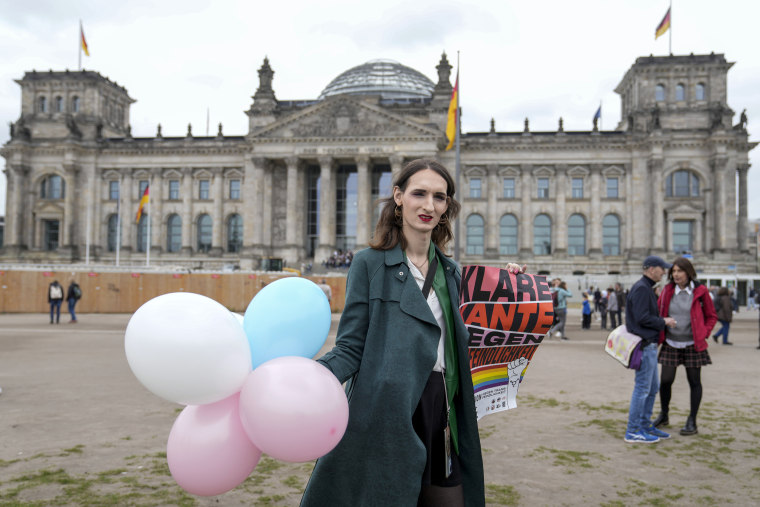
BERLIN — German lawmakers on Friday approved legislation that will make it easier for transgender, intersex and nonbinary people to change their name and gender in official records.
The “self-determination law,” one of several social reforms that Chancellor Olaf Scholz’s liberal-leaning coalition government pledged when it took office in late 2021, is set to take effect Nov. 1.
Germany, the European Union’s most populous nation, follows several other countries in making the change. Parliament’s lower house, the Bundestag, approved it by 374 votes to 251 with 11 abstentions.
The German legislation will allow adults to change their first name and legal gender at registry offices without further formalities. They will have to notify the office three months before making the change.
The existing “transsexual law,” which dates back four decades, requires individuals who want to change gender on official documents to first obtain assessments from two experts “sufficiently familiar with the particular problems of transsexualism” and then a court decision.
Since that law was drawn up, Germany’s top court has struck down other provisions that required transgender people to get divorced and sterilized, and to undergo gender-transition surgery.
“For over 40 years, the ‘transexual law’ has caused a lot of suffering ... and only because people want to recognized as they are,” Sven Lehmann, the government’s commissioner for queer issues, told lawmakers. “And today we are finally putting an end to this.”
The new legislation focuses on individuals’ legal identities. It does not involve any revisions to Germany’s rules for gender-transition surgery.
The new rules will allow minors 14 years and older to change their name and legal gender with approval from their parents or guardians; if they don’t agree, teenagers could ask a family court to overrule them.
In the case of children younger than 14, parents or guardians would have to make registry office applications on their behalf.
After a formal change of name and gender takes effect, no further changes would be allowed for a year. The new legislation provides for operators of, for example, gyms and changing rooms for women to continue to decide who has access.
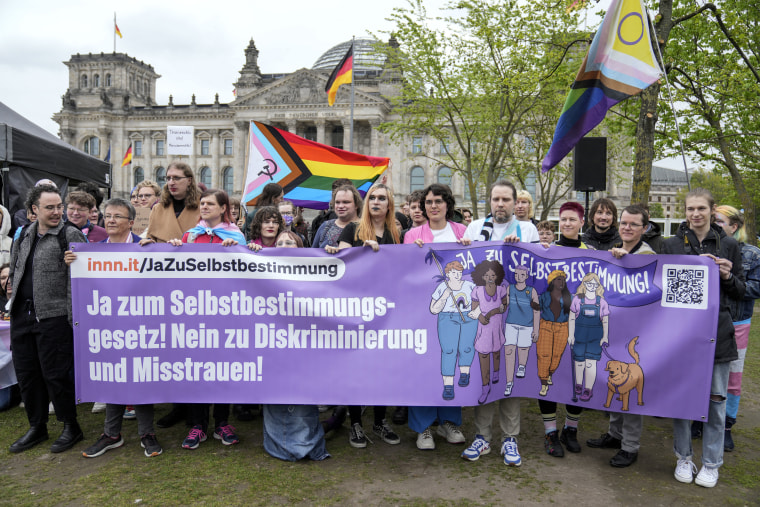
Nyke Slawik, a transgender woman elected to parliament in 2021 for the Greens, one of the governing parties, recounted her experience of going through the current system a decade ago. She said she had had enough of being asked “is that your brother’s ID?” when she had to identify herself.
“Two years, many conversations with experts and one district court process later, it was done — the name change went through, and I was nearly 2,000 euros ($2,150) poorer,” she told lawmakers. “As trans people, we repeatedly experience our dignity being made a matter for negotiation.”
The mainstream conservative opposition faulted the legislation for what it described as a lack of safeguards against abuse and a lack of protection for young people. Conservative lawmaker Susanne Hierl complained that the government is “ignoring the justified concerns of many women and girls.”
“You want to satisfy a loud but very small group and, in doing so, are dividing society,” Hierl said.
Martin Reichardt of the far-right Alternative for Germany blasted what he called “ideological nonsense.”
Among others, Denmark, Norway, Finland and Spain already have similar legislation.
In the U.K., the Scottish parliament in 2022 passed a bill that would allow people aged 16 or older to change the gender designation on identity documents by self-declaration. That was vetoed by the British government, a decision that Scotland’s highest civil court upheld in December .
In other socially liberal reforms, Scholz’s government has legalized the possession of limited amounts of cannabis; eased the rules on gaining German citizenship and ended restrictions on holding dual citizenship; and ended a ban on doctors “advertising” abortion services. Same-sex marriage was already legalized in 2017.
The Associated Press

Inside and Around the Parliament
Kurze Details
- Clock Time: 10:00 , 15:00
- Calendar Days: Fri - Mon
On a tour of the historic government district you will learn a lot about the political development in Germany.
- Starts at Brandenburg Gate
- 2 Hours and 30 Minutes
Visit the Parliament in Berlin
During your visit to the Parliament you will learn about the history of the house, as well as the distribution of seats between the political groups and the government.
Then you will enjoy the panoramic view over East and West Berlin from the terrace or the dome of the 53-meter high building, under the description of the city guide. The visit to the Reichstag requires a prior registration. You will enter your information during the online booking process.
- More Than 15 People in One Group (9 Years and Over): €10 per person
- Chevron down Itinerary
- Memorial church
- Bikini house
- Europa center
- Embassy area
- Culture forum (Philharmoie)
- Potsdamer square
- Brandenburg gate in government area
- Holocaustmemorial
- Friedrichstraße with Checkpoint Charlie
- Gendarmenmarkt
- Unter den Linden
- Museumsisland
- Berlin Palace
Ähnliche Touren
- Most Popular!
- Calendar Wed - Sat
- Clock 10:30
- Hour Glass 2.5 Hours
The Divided Berlin
For almost 30 years, Berlin was a divided city, a unique situation in German history. We start at Brandenburg Gate – a symbol of division and unification.
- Calendar Wed - Sun
- Clock 14:30
- Hour Glass 3 Hours
Berlin on Foot, Train and Bus
An impressive guided tour beginning at Memorial Church, a famous landmark of west Berlin, just across from the Bikini House and at the edge of the Tiergarten.
German transport minister under fire for weekend driving ban threat
- Medium Text
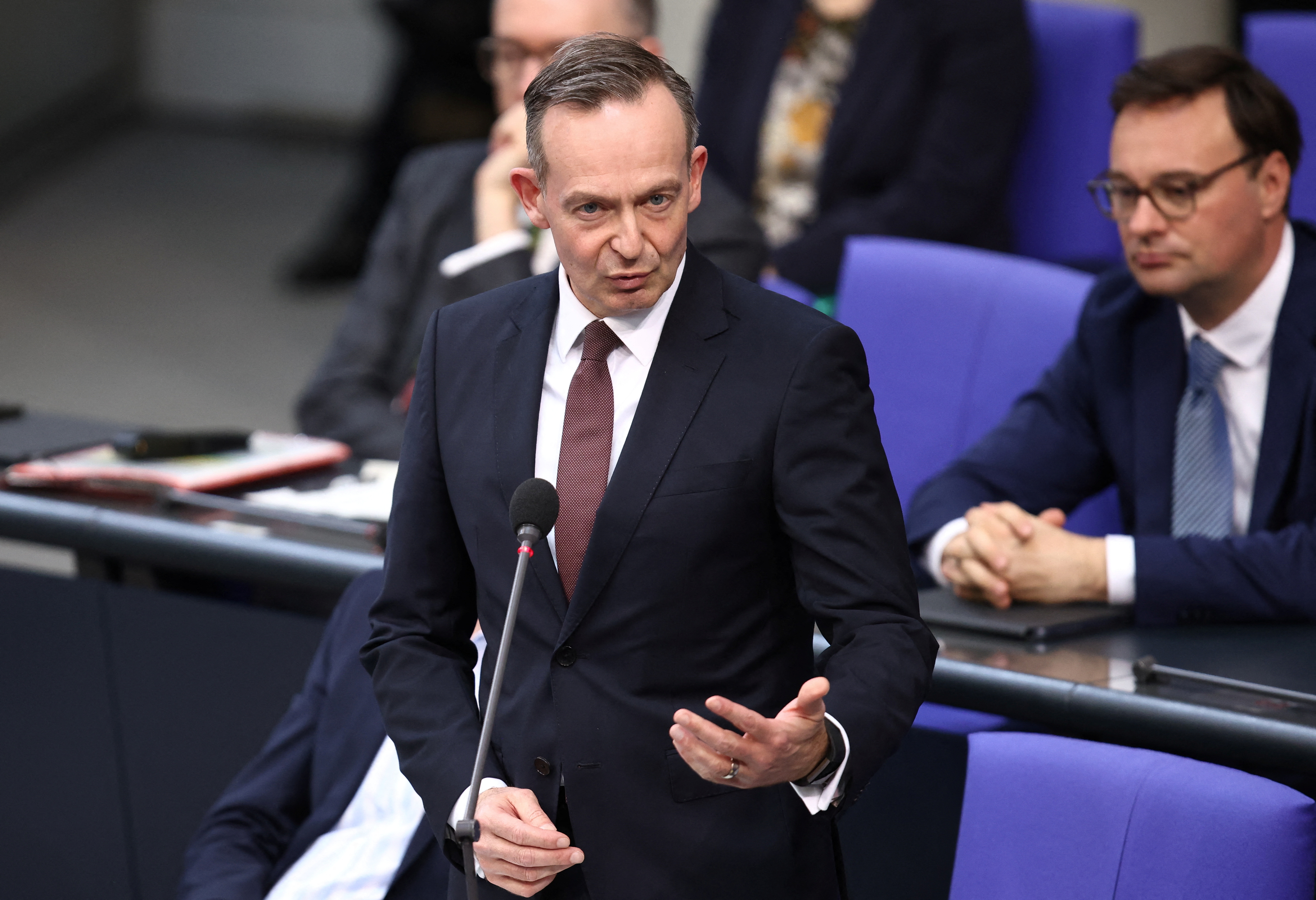
Coming soon: Get the latest news and expert analysis about the state of the global economy with Reuters Econ World. Sign up here.
Reporting by Riham Alkousaa and Markus Wacket, additional reporting by Andrey Sychev; Editing by Devika Syamnath
Our Standards: The Thomson Reuters Trust Principles. New Tab , opens new tab

Thomson Reuters
Riham Alkousaa is the energy and climate change correspondent for Reuters in Germany, covering Europe’s biggest economy's green transition and Europe’s energy crisis. Alkousaa is a Columbia University Journalism School graduate and has 10 years of experience as a journalist covering Europe’s refugee crisis and the Syrian civil war for publications such Der Spiegel Magazine, USA Today and the Washington Times. Alkousaa was on two teams that won Reuters Journalist of the year awards in 2022 for her coverage of Europe’s energy crisis and the Ukraine war. She has also won the Foreign Press Association Award in 2017 in New York and the White House Correspondent Association Scholarship that year.

World Chevron
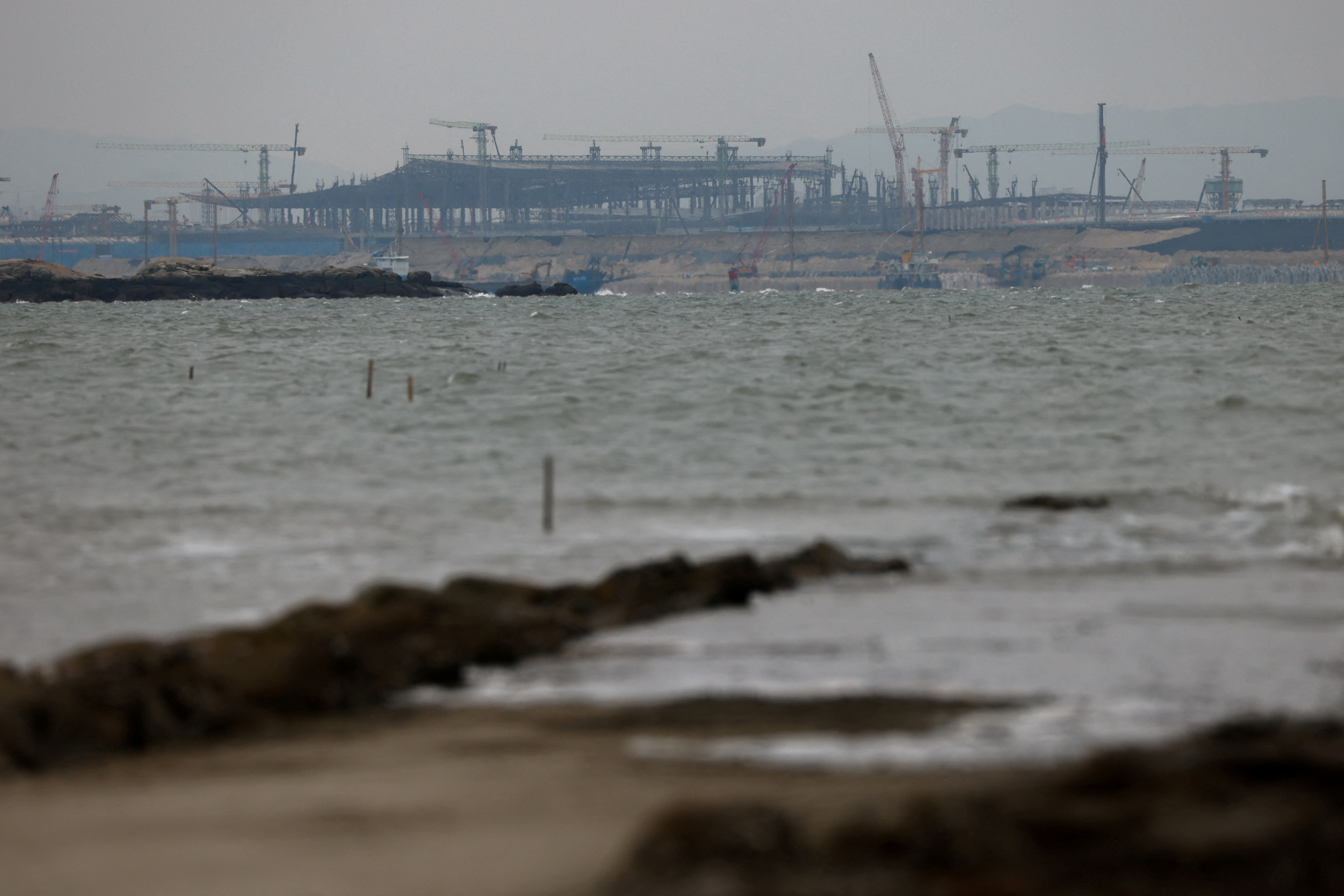
Taiwan says new Chinese air routes threaten Taiwanese islands' flight safety
Taiwan said on Friday China's decision to open new air routes that run close to two Taiwanese-controlled islands was a flight safety risk taken without consultation, and said it would demand any aircraft using them be asked to turn around.

Russian oil producer Bashneft has installed anti-drone nets to protect key facilities at its refineries from potential Ukrainian attack, the head of the republic of Bashkortostan where the company is based was quoted as saying on Friday.
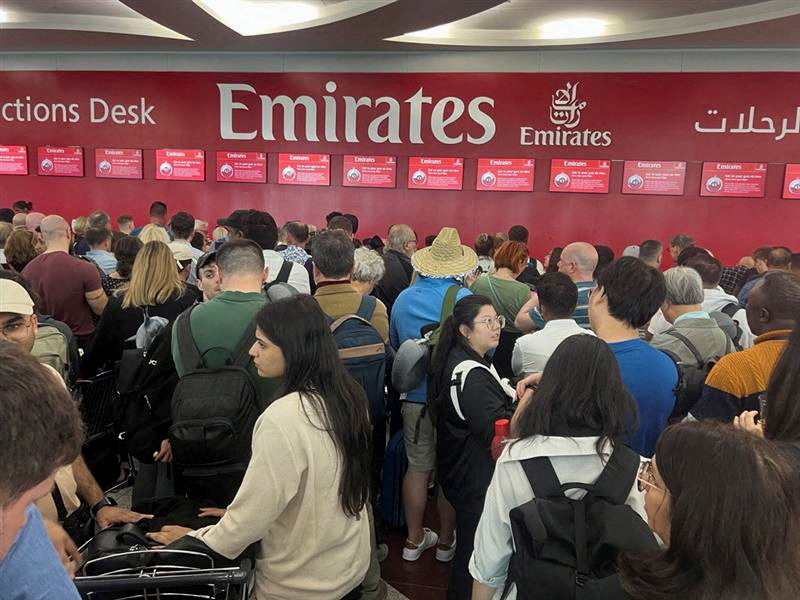
- Election 2024
- Entertainment
- Newsletters
- Photography
- Personal Finance
- AP Investigations
- AP Buyline Personal Finance
- AP Buyline Shopping
- Press Releases
- Israel-Hamas War
- Russia-Ukraine War
- Global elections
- Asia Pacific
- Latin America
- Middle East
- Election Results
- Delegate Tracker
- AP & Elections
- March Madness
- AP Top 25 Poll
- Movie reviews
- Book reviews
- Personal finance
- Financial Markets
- Business Highlights
- Financial wellness
- Artificial Intelligence
- Social Media
German parliament votes to make it easier for people to legally change their name and gender
German lawmakers have approved legislation that will make it easier for transgender, intersex and nonbinary people to change their name and gender in official records.
Demonstrators protest demanding a law to protect the rights of the transgender community outside of the parliament Bundestag building in Berlin, Friday, Apri 12, 2024. German lawmakers on Friday approved legislation that will make it easier for transgender, intersex and nonbinary people to change their name and gender in official records. (AP Photo/Ebrahim Noroozi)
- Copy Link copied
A demonstrator holds a fan during a protest demanding a law to protect the rights of the transgender community outside of the parliament Bundestag building in Berlin, Friday, April 12, 2024. German lawmakers on Friday approved legislation that will make it easier for transgender, intersex and nonbinary people to change their name and gender in official records. (AP Photo/Ebrahim Noroozi)
Demonstrators protest demanding a law to protect the rights of the transgender community outside of the parliament Bundestag building in Berlin, Friday, April 12, 2024. German lawmakers on Friday approved legislation that will make it easier for transgender, intersex and nonbinary people to change their name and gender in official records. (AP Photo/Ebrahim Noroozi)
A Demonstrator protests demanding a law to protect the rights of the transgender community outside of the parliament Bundestag building in Berlin, Friday, Apri 12, 2024. German lawmakers on Friday approved legislation that will make it easier for transgender, intersex and nonbinary people to change their name and gender in official records. (AP Photo/Ebrahim Noroozi)
A demonstrator protests demanding a law to protect the rights of the transgender community outside of the parliament Bundestag building in Berlin, Friday, Apri 12, 2024. German lawmakers on Friday approved legislation that will make it easier for transgender, intersex and nonbinary people to change their name and gender in official records. (AP Photo/Ebrahim Noroozi)
BERLIN (AP) — German lawmakers on Friday approved legislation that will make it easier for transgender, intersex and nonbinary people to change their name and gender in official records.
The “self-determination law,” one of several social reforms that Chancellor Olaf Scholz’s liberal-leaning coalition government pledged when it took office in late 2021, is set to take effect on Nov. 1.
Germany, the European Union’s most populous nation, follows several other countries in making the change. Parliament’s lower house, the Bundestag, approved it by 374 votes to 251 with 11 abstentions.
The German legislation will allow adults to change their first name and legal gender at registry offices without further formalities. They will have to notify the office three months before making the change.
The existing “transsexual law,” which dates back four decades, requires individuals who want to change gender on official documents to first obtain assessments from two experts “sufficiently familiar with the particular problems of transsexualism” and then a court decision.
Since that law was drawn up, Germany’s top court has struck down other provisions that required transgender people to get divorced and sterilized, and to undergo gender-transition surgery.
“For over 40 years, the ‘transsexual law’ has caused a lot of suffering ... and only because people want to be recognized as they are,” Sven Lehmann, the government’s commissioner for queer issues, told lawmakers. “And today we are finally putting an end to this.”
The new legislation focuses on individuals’ legal identities. It does not involve any revisions to Germany’s rules for gender-transition surgery.
The new rules will allow minors 14 years and older to change their name and legal gender with approval from their parents or guardians; if they don’t agree, teenagers could ask a family court to overrule them.
In the case of children younger than 14, parents or guardians would have to make registry office applications on their behalf.
After a formal change of name and gender takes effect, no further changes would be allowed for a year. The new legislation provides for operators of, for example, gyms and changing rooms for women to continue to decide who has access.
Nyke Slawik, a transgender woman elected to parliament in 2021 for the Greens, one of the governing parties, recounted her experience of going through the current system a decade ago. She said she had had enough of being asked “is that your brother’s ID?” when she had to identify herself.
“Two years, many conversations with experts and one district court process later, it was done — the name change went through, and I was nearly 2,000 euros ($2,150) poorer,” she told lawmakers. “As trans people, we repeatedly experience our dignity being made a matter for negotiation.”
The mainstream conservative opposition faulted the legislation for what it described as a lack of safeguards against abuse and a lack of protection for young people. Conservative lawmaker Susanne Hierl complained that the government is “ignoring the justified concerns of many women and girls.”
“You want to satisfy a loud but very small group and, in doing so, are dividing society,” Hierl said.
Martin Reichardt of the far-right Alternative for Germany blasted what he called “ideological nonsense.”
Justice Minister Marco Buschmann said in a statement that “there are numerous precautions against possibilities of abuse, however improbable they may be.” He insisted that the new law takes into account the interests of the whole of society and said “much less will change with this law than some say.”
Among others, Denmark, Norway, Finland and Spain already have similar legislation.
In the U.K., the Scottish parliament in 2022 passed a bill that would allow people aged 16 or older to change the gender designation on identity documents by self-declaration. That was vetoed by the British government, a decision that Scotland’s highest civil court upheld in December .
In other socially liberal reforms, Scholz’s government has legalized the possession of limited amounts of cannabis; eased the rules on gaining German citizenship and ended restrictions on holding dual citizenship; and ended a ban on doctors “advertising” abortion services. Same-sex marriage was already legalized in 2017.
- Legal framework
- Adoption of legislation
- Scrutiny of the government
- Election of the Federal Chancellor
- Federal budget
- Party funding
- Plenary agenda
- Calendar of Sittings
- Secretaries
- Distribution of Seats
- Functions and duties
- Election of the Presidium
- Speeches and texts by the President of the Bundestag
- Council of Elders
- Parliamentary groups
- Citizens‘ Assemblies
- Armed Forces Commissioner
- Administration
- National symbols
- German parliamentarism
- History fact sheets
- Climate Action and Energy
- Cultural and Media Affairs
- Digital Affairs
- Economic Affairs
- Economic Cooperation and Development
- Education, Research and Technology Assessment
- Environment, Nature Conservation, Nuclear Safety and Consumer Protection
- European Union Affairs
- Family Affairs, Senior Citizens, Women and Youth
- Food and Agriculture
- Foreign Affairs
- Housing, Urban Development, Building and Local Government
- Human Rights and Humanitarian Aid
- Internal Affairs and Community
- Labour and Social Affairs
- Legal Affairs
- Scrutiny of Elections, Immunity and the Rules of Procedure
- Parliamentary Advisory Council on Sustainable Development
- The Bundestag's rights to participate in EU affairs
- Europe in the committees
- The Bundestag and the European Parliament
- Brussels Office
- International Parliamentary Assemblies
- International relations
- Exchange programmes
- Parliamentary Documentation
- Official records
- Minutes of plenary proceedings
- Parliamentary Library
- Catalogue of the Library
- Research and Documentation Services
- Parliamentary Archives
- Press Documentation Division
- Text Archive
- Digital Image Service/Image Archive
- Parliamentary Television
- Visit to plenary sittings
- Guided Tours
- Historical Exhibition
- Selected works
- We're glad to be of assistance!
- The Bundestag on the move
- Energy concept
Something’s changed
The URL of the page you are trying to access has changed
You will be redirected in 10 sec.
German Bundestag - Homepage
Services for pre-booked visitors, seite teilen.

IMAGES